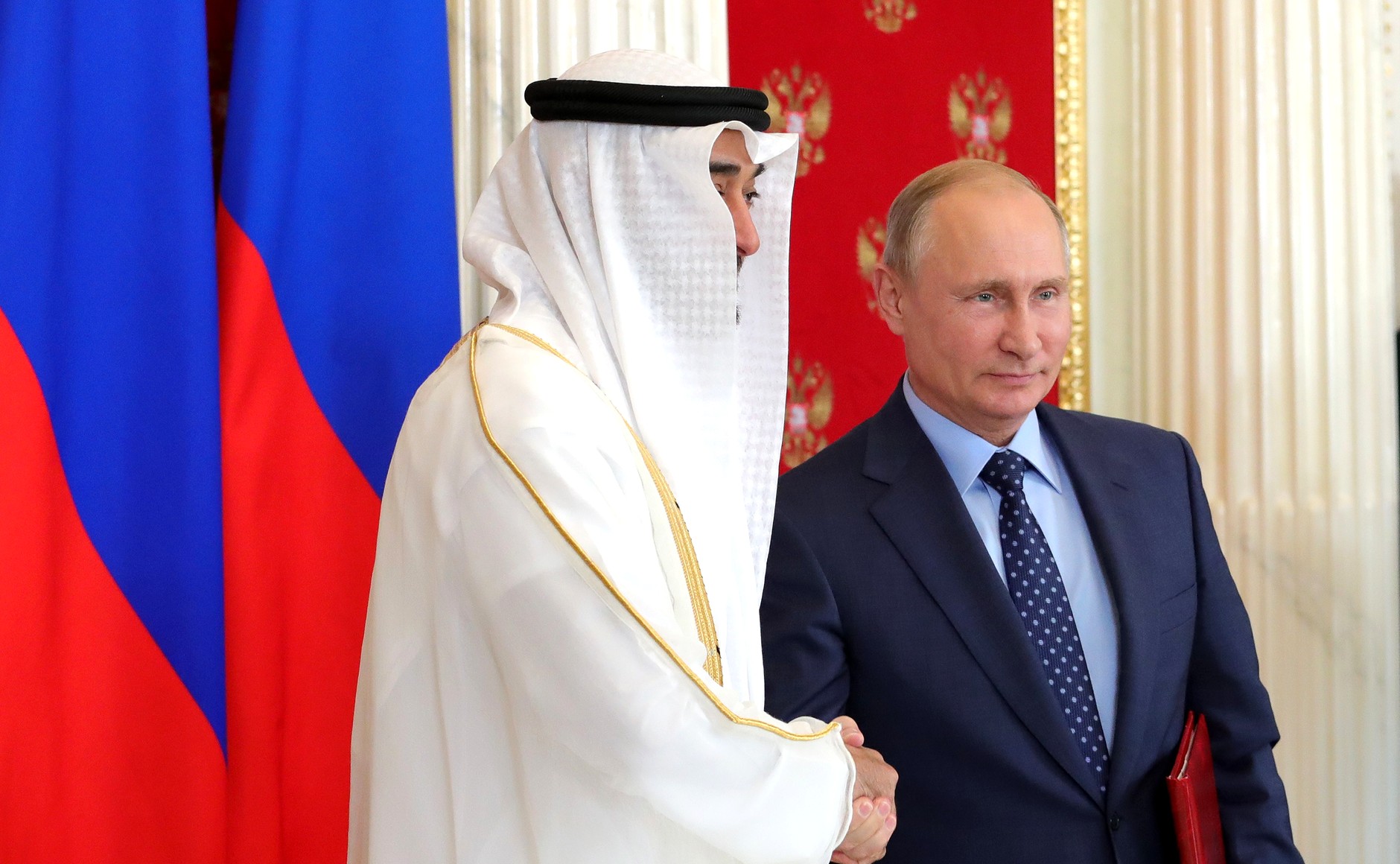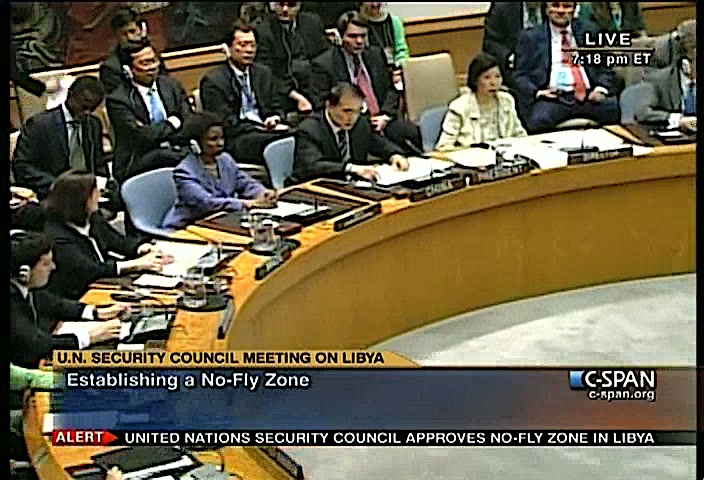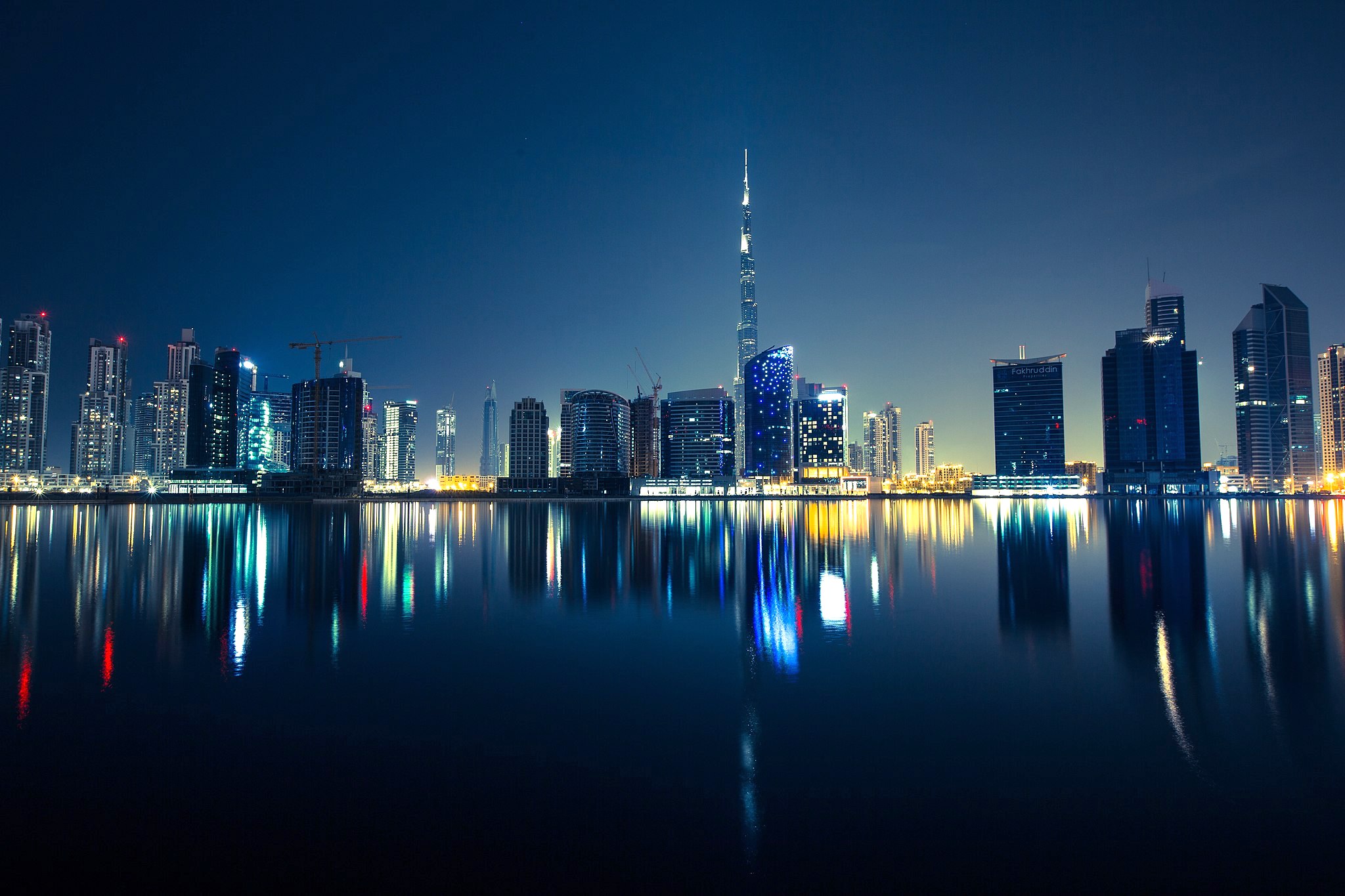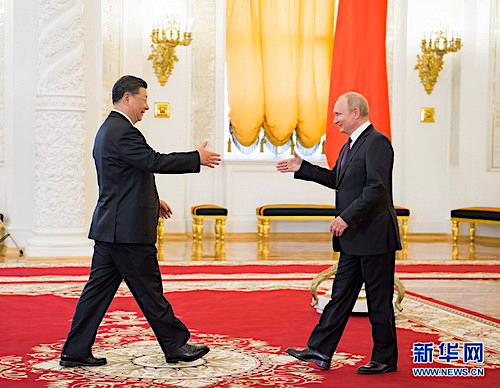Gulf Arab regimes, and other developing countries, will adjust to a new world where power is shifting. It is no longer the world the U.S. shaped after the Cold War, writes As’ad AbuKhalil.
By As`ad AbuKhalil
Special to Consortium News

It is premature to determine the exact shape of the world in the wake of the Russian military intervention in the Ukraine. At the risk of repeating dreaded cliches, it is clear that the world order has been irrevocably altered. The post-cold war era is over, forever.
The U.S. established global supremacy after the collapse of the U.S.S.R. and ensured that NATO would form a security siege around Russia to keep it weak and vulnerable — and to maintain American hegemony throughout the continent. Never has America been challenged in such a direct and focused way as by Russia’s intervention in Ukraine.
The old rules that the U.S. imposed — by force — will be no more. While China has been cautious in expressing support for Russia in its official pronouncements, its media have been clear in refuting U.S. propaganda claims. The reverberations of the cataclysmic event will be felt for years to come and will affect regional and international conflicts.
The impact of the Russian-Ukrainian war will also be felt in the Middle East, which has a long history of involvement in the Soviet and Russian-U.S. rivalry.
Despite U.S. pressure, no Arab states are participating in the economic war on Russia by imposing sanctions, joining most of Latin America and Africa, as well as Iran, India, Pakistan and China. Saudi Arabia and other Gulf states have resisted U.S. pressure to pump more oil to make up for the U.S. ban on Russian oil imports.
Most significantly, Riyadh is in talks with China to trade some of its oil in yuan, which would deal a blow to the U.S. dollar that is used in 80 percent of world oil sales. Until now, the Saudis have exclusively used the dollar.
Moscow is trying to defeat the West’s ferocious economic assault on Russia by creating a separate economic and financial system with China. Arab nations could play an important part in it, effectively turning their backs on the U.S. (In a sign of the Gulf’s coolness to Washington, The Wall Street Journal, for instance, reported that Emirati and Saudi leaders have refused to take Biden’s phone calls.)
Background to Geopolitical Shift
The shape of international relations was shaken in 2011 with the passage of U.N. Security Council resolution 1973, which was limited to setting up a no-fly zone to protect civilians in Libya supposedly in danger of a massacre at the hands of Libyan leader Moamar Qadhafi. (A British parliamentary report later found there were no such threats and was based on inaccurate intelligence and “erroneous assumptions.”)
The resolution did not permit ground forces to enter Libya. The language was clear. It said the Security Council:
“Decides to establish a ban on all flights in the airspace of the Libyan Arab Jamahiriya in order to help protect civilians. [and] AuthorizesMember States that have notified the Secretary-General, acting nationally or through regional organizations or arrangements, and acting in cooperation with the Secretary-General, to take all necessary measures … to protect civilians and civilian populated areas under threat of attack in the Libyan Arab Jamahiriya, including Benghazi, while excluding a foreign occupation force of any form on any part of Libyan territory. ”
Despite these limitations, the U.S. and NATO took the resolution to mean a license for NATO to overthrow a government that the U.S. had long complained about. It didn’t matter that the Libyan dictatorial regime was cooperating with the U.S. in the years leading up to its overthrow. Then U.S. Secretary of State Hillary Clinton had even met the chief of Libya’s secret police, who happened to to be the ruler’s son.
Russia, ruled at the time by President Dmitry Medvedev, abstained on the resolution, as had China. Both countries had evidently believed the mission would be restricted to the non-fly zone. Vladimir Putin, who was prime minister at the time, was reportedly furious with Medvedev over the abstention.
After it became clear NATO was violating the resolution by overthrowing Qadhafi, China and Russia, both veto holders, were determined to change the course of the Security Council to prevent the U.S. from again using it as cover for military interventions and regime change. The U.S. started to lose its undisputed global supremacy at that point.
Moscow and Beijing were both building up their military capabilities and were becoming more assertive on the international stage. Fearful of changes in the global configuration of power, the Biden administration incorporated strong language into its National Security Strategy (issued by successive administrations) to make clear U.S. rejection of any competition from Russia and China. (Biden’s strategy complained about Chinese assertiveness. (How dare any country but the U.S. be assertive in the world?) It is one thing for the U.S. to insist on global supremacy and another to guarantee it without a cost in blood and money.
Russia, in fact showed its assertiveness four years after the Libya resolution when Russia intervened to support the Syrian regime. Putin at the General Assembly asked the U.S. to join Moscow in the fight, an offer the U.S. rejected.
Middle East Reverberations
In the Middle East, the effects of the new global conflict have already reverberated within U.S. client regimes, many of whom also have good relations with Russia. The United Arab Emirates is one of those U.S. clients. Washington supplies it with advanced military technology, (despite its abysmal human rights record). In return, the UAE works with the U.S., recently establishing a strong alliance with Israel. The U.S. rewarded the UAE with the sale of advanced fighter jets.
And yet the UAE abstained on a March 3 Security Council resolution condemning Russia’s actions in Ukraine that was vetoed by Russia, while it voted in favor of a General Assembly resolution saying the same thing. Now the UAE, and especially Dubai, is being seen as a refuge for Russian billionaires who have been heavily sanctioned by the West.
Gulf countries like the UAE are caught between their complete loyalty to the U.S. and their increasing closeness to the Russian government, especially as they lament what they regard as American retrenchment from the Middle East. Many Gulf despots are still unhappy that the U.S. let Hosni Mubarak of Egypt and Zein Abidin Bin Ali on Tunisia fall during the 2011 Arab uprisings.
Only Qatar among the Gulf countries took a strong stance in support of Ukraine, but has not joined the economic war against Russia. Qatar’s emir was recently welcomed in the Oval Office and the country was awarded the status of “major non-NATO ally.” Furthermore, the U.S. wants Qatar to fill the gap of Europe’s gas needs in the wake of sanctions on Russian gas sales (it is curious that the White House worked with Qatar on that before the first Russian soldier moved towards Ukraine.)
US Consensus Fractured
The U.S. will no longer achieve a consensus in the world according to its own interests. While China is neither prepared, nor willing, to challenge U.S. foreign policy head-on for now, its cooperation and treaties with U.S. foes (Iran chiefly) is an indication that China is planning to operate in a world not subject to U.S. dictates.
Chinese government statements during the crisis have been cautious, but social media in China and Chinese diplomats’ pronouncements via social media have been squarely sympathetic to the Russian stance. China has increased economic ties with Russia to soften the blow of the sanctions, including allowing Russia to use its UnionPay system to replace Western credit cards.
Russia’s ejection from the SWIFT international banking system has seen Russia rely on it own System for Transfer of Financial Messages (SPFS) and that may be linked to China’s Cross-Border Interbank Payment System (CIPS). Russia has begun making payments to China in renminbi, weakening the dollar as the world’s premier currency. The blowback effects on the West of its economic war is leading to separate economic and financial systems that is fracturing U.S. global dominance.
Gulf regimes, and other developing countries, will adjust to a new world where the power configuration is changing. It is no longer the world the U.S. shaped after the Cold War.
Russia doesn’t have America’s power or influence. But Russia is an influential regional actor; its role in Syria in support of the Syrian regime showed its ability to shore up a weak regime and to operate free of U.S. plots to overthrow Bashar al-Assad. Gulf governments are already planning for a world in which the U.S. is less militarily assertive than before. Toward that end, the UAE established its strong alliance with Israel.
Impact on Arab-Israeli Conflict
Gulf regimes aren’t favored in Washington quite the same way Israel is. Israel followed the U.S., expressing support for Ukraine. It can’t afford to antagonize the Biden administration in the wake of the damage to its image during the Obama-Netanyahu era.
The Russian-Ukrainian crisis will undermine U.S. and E.U. rhetoric on the Arab-Israeli conflict. It won’t be easy to sell the so-called peace-process after the West adamantly refusing to support diplomacy between Russia and Ukraine, while the U.S. preaches strict pacifism for Arabs in the face of decades of Israeli occupation and aggression.
After the first two days of conflict, some 30 countries sent advanced missiles and arms to Ukraine and championed the right of resistance. Palestinians, on the other hand, are denied even the right to peaceful resistance. The U.S. and Europe have gone so far as to ban BDS (boycott, sanctions, and divestment in Israel) while wielding sanctions around the world. How can Palestinians ever take seriously Western insistence that their struggle against occupation should never resort to violent means?
The world we live in is changing, and the Russian intervention in Ukraine will not be confined to Ukraine, or even to Europe. The U.S. is learning that the world is slipping from its hands. It won’t tolerate it.
It will resort to force in its attempt to maintain its grip over humanity. Violent conflicts are very likely to now dominate our world.
As`ad AbuKhalil is a Lebanese-American professor of political science at California State University, Stanislaus. He is the author of the Historical Dictionary of Lebanon (1998), Bin Laden, Islam and America’s New War on Terrorism (2002) and The Battle for Saudi Arabia (2004). He tweets as @asadabukhalil
The views expressed are solely those of the author and may or may not reflect those of Consortium News.





This MAJOR event is so far going unnoticed by the MSM. No surprise of course.
U.S. FED steals Russia assets. Obvious danger to China and their holdings. MEGA rules change!
hxxps://mishtalk.com/economics/what-does-china-do-with-a-dollar-thats-no-longer-risk-free-buy-gold
‘Velly intellesting,’ as the buffoon in the Nazi helmut used to say on Laugh-In. Esp. the way in which US/NATO groupies averted the clear language vs. Libyan invasion. Prof Abu’Khalil has a very prominent spot for the UAE as a possible fulcrum for shifting area politics. I am no expert, but applaud his ability to cite detailed support for the thesis.
Quite notably, theUAE also hosted Zelensky just over a month ago, per official sources, netting $3B worth of deals:
hxxps://www.ukrinform.net/rubric-polytics/3191254-zelenskys-visit-to-uae-is-one-of-the-most-successful-presidents-office.html
Perhaps Volodymyr has purchased a vacation dacha there. He might need it. Soon?
Thank you for an excellent article on the birth of a new global paradigm.
However, I do question the application of the western propaganda terms ‘regime’ and ‘administration’. Are the designations applied here unintentional, simply a an inadvertent hangover of western convention or is the author inserting his own subtle bias? Specifically why is the Biden regime referred to as an ‘administration’ and the Syrian administration a ‘regime’. As applied here such terms taint an otherwise good article.
The stench of Western hypocrisy over the Russia/Ukraine war will wake up many to the fact that Israelis have been getting away with the same despicable behavior Putin is being condemned for, and the Israelis have been enjoying their accountability now for 70 years.
Two recent events highlight this hypocricy. One is Congress’s passage of the “Israel Normalizations Act,” (article below) and the other is the statement by the Biden Administration that Israel will be given a billion dollars more than the yearly sum of 3.8 billion in order to pay for the rockets the Israelis used a year ago last March to blow the daylights out of the Palestinian citizens of Gaza.
Congress’s ‘Israel Normalization Act’ normalizes ethnic cleansing and impunity – Mondoweiss
Let’s hope that public opinion can be moved up a notch against Israel’s status in the world because of such moral hypocrisy.
Arab countries have a variety of reasons to be aloof from sanctions on Russia and “sympathy for Ukraine”.
Among oil rich countries, the casual freeze of Russian central bank reserves is very chilling. Oil exporters have fat years, expensive oil, and lean years, plummeting prices, so they have a need to accumulate reserves and spend them as the need arise. Thus they are vulnerable to freeze blackmail, and they can well be on the receiving end. For all high sounding justifications, this is piracy, and the justification have to sound ridiculous to them. Moreover, they have to rethink their “insurance policy” in the form of overpriced and thus lucrative contracts for Western arms. It may be better to spread the reserve assets widely, be it China, India, Africa or Latin America, or even Russia.
Venezuela is not democratic, so the assets can be taken away? If the West cares about “democracy” so much as to commit asset piracy, what about them? Iraq disobeys the diktat to allow American troops, and is instantly threaten with the freeze? Doesn’t it reduce them to timid vassaldom — may be good for a timid Belgium, but not to the ego of absolute monarchs.
Countries like Egypt need trade with Russia for revenue (produce, tourism) and critical needs. E.g. Egypt needs to diversify energy, and Russia offers nuclear power package with the best price, delivery/construction time etc. Add grain, fertilizers etc., the losses on joining sanctions exceed the value of subsidies quite a bit.
And the lack of any compassion on the West to Arab suffering, with may glaring examples, makes the ordinary people resistant to the chorus against Russia in the Western media.
The head of the Jewish Defense League said yesterday that his group was forming teams to “follow, question and harass” Soviet diplomats in the city.
Rabbi Meir Kahane, the founder and leader of the militant Jewish organization, said the purpose of the harassment would be to provoke a crisis in Soviet?American relations that would stop the two countries from “building bridges over Jewish bodies.”
“In short,” he said, referring to his plan to harass Soviet personnel here, “the life of each Russian will be made miserable.” – nytimes, 1971
The Jewish Defense League is charging that the emigration of Jews from the Soviet has slowed from a high of almost 75.000 in 1973 to a rate of about 13,000 this year as a result of the détente policies of the United States and the Soviet Union that have eased the pressure on Moscow to allow more Jews to leave the country. “We are committed to creating a crisis in Soviet?United States relations,” Mr. Fisch said, “because both countries have decided to ignore the Soviet Jew issue. We are going to provoke an international crisis.” – nytimes, 1976
“The State of Israel must take advantage of the war in Europe to bring as many Jews from Ukraine and Russia to Israel as possible.” -Bezalel Smotrich, 1 week ago
A dose of icy-cold, hard geopolitical reality in the face of the Biden administration’s idiocy, perfidy and ineptitude. Something very much shared with the predecessor Obama-Clinton-Biden administration. It is not only nuclear holocaust at risk but the demise of the US dollar and with it, another great depression in the United States, rather than as orchestrated, in the Russian Federation. The oligarchic “Western” propaganda press ignores the foregoing, at our peril, and by the time we wake up it will be too late for anything except regrets and excuses seeking to somehow shift the blame to Donald Trump.